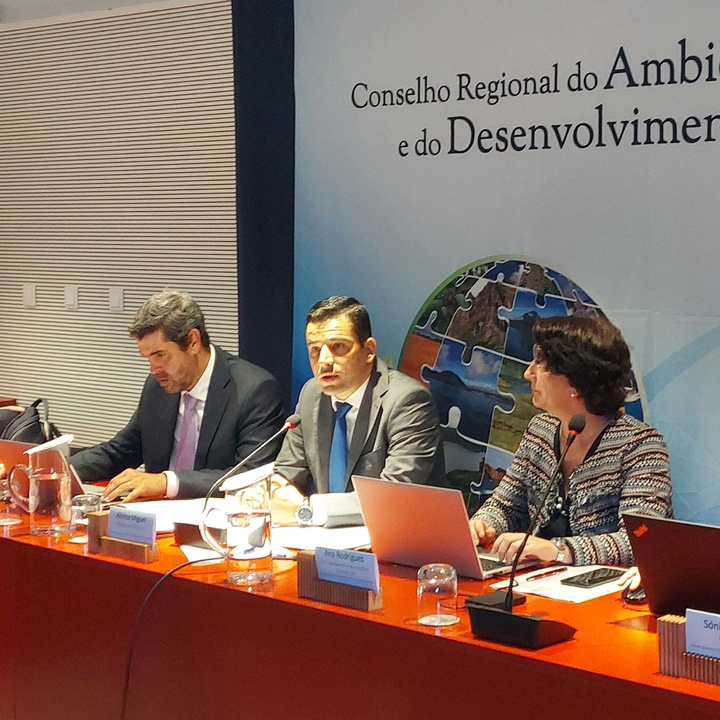Text size:
News

Draft Investment Plan of the Regional Secretariat for the Environment and Climate Change for 2024 presented to CRADS
Oct. 17, 2023
On Monday, the Regional Secretary for the Environment and Climate Change, Alonso Miguel, chaired the second ordinary meeting of 2023 of the Regional Council for the Environment and Sustainable Development (CRADS) at the Luís da Rocha Monteiro Auditorium in Horta.
The agenda of the CRADS meeting was marked by the presentation of the preliminary draft of the Regional Annual Plan for 2024 concerning the areas under the scope of the Regional Secretariat for the Environment and Climate Change.
According to Alonso Miguel, the Secretariat’s Investment Plan, which is still at the preliminary draft stage, has the largest allocation since the beginning of this legislature, totalling 21 million euros, with around 2.2 million euros more than planned for the 2023 Plan, which represents an increase in funding of approximately 12%.
“In addition to this investment, there is also around 8.2 million euros corresponding to investment in public works under the responsibility of the Regional Secretariat for the Environment and Climate Change, to be carried out by the Regional Secretariat for Tourism, Mobility and Infrastructures, under the terms of the organisation of the 13th Regional Government of the Azores,” he said.
“One of the main focuses will continue to be on fighting climate change, with an investment of around 1.4 million euros planned to continue implementing the LIFE IP CLIMAZ project, as well as the amount allocated to the Legal and Financial Regime of Support for Climate Emergencies, increased to 430,000 euros,” he continued.
The Regional Secretary also announced that “a new project will begin, in collaboration with the Portuguese Institute for Sea and Atmosphere (IPMA), to set up the Atlantic Climate Observatory in the Azores, to collect atmospheric data that is fundamental to studying climate change in the Atlantic region, as well as monitoring greenhouse gases on a global scale.”
Alonso Miguel emphasised that, in terms of water resources, a significant investment of 4.2 million euros is planned, which will significantly strengthen the capacity to monitor, maintain and upgrade the Region's hydrographic network, with emphasis on the investment of 2 million euros dedicated for training the operational services of this regional secretariat, with the acquisition of equipment and machinery suitable for this purpose, which will make a significant contribution to preventive action in the context of climate change and to safeguarding people and property.
Concerning waste management, the Regional Secretary highlighted “the biggest investment ever in the Ecofreguesia Programme, with a planned budget of one million euros, representing an increase of 82% compared to 2023, which will make an important contribution to cleaning up public spaces, including rivers and the coastline”, and also announced the launch of a “new project to modernise the recycling processes at the Waste Processing Centres, with the purchase of new equipment, for an investment of just over one million euros”.
The person responsible for the environment in the Region also emphasised “the significant investment of 3.4 million euros planned to continue implementing ongoing LIFE projects, which are fundamental instruments for implementing the strategy defined in terms of nature conservation and the preservation of biodiversity, which represents an increase of 26% compared to 2023”, while also stressing the “very significant investment of 2 million euros reserved for incentives to maintain traditional vineyard landscapes and orchards of traditional species”.
The agenda for the CRADS meeting also included the presentation of the proposal to amend the diploma that created the SiRGIC, to extend its free of charge until the end of 2025 and extend this service to the network of Lojas RIAC in the Azores.
Also noteworthy was the presentation to the councillors of the preliminary proposal to revise the Azores Marine Protected Areas Network (RAMPA), as well as the proposal to revise the Flood Risk Management Plan for the Autonomous Region of the Azores.
During the meeting, the proposal to amend the Ordinance approving access conditions, curriculum plans and knowledge assessment regime for the training courses for Azorean Nature Parks guides, Pico Mountain guides and Faial Caldera guides were also presented and analysed.

